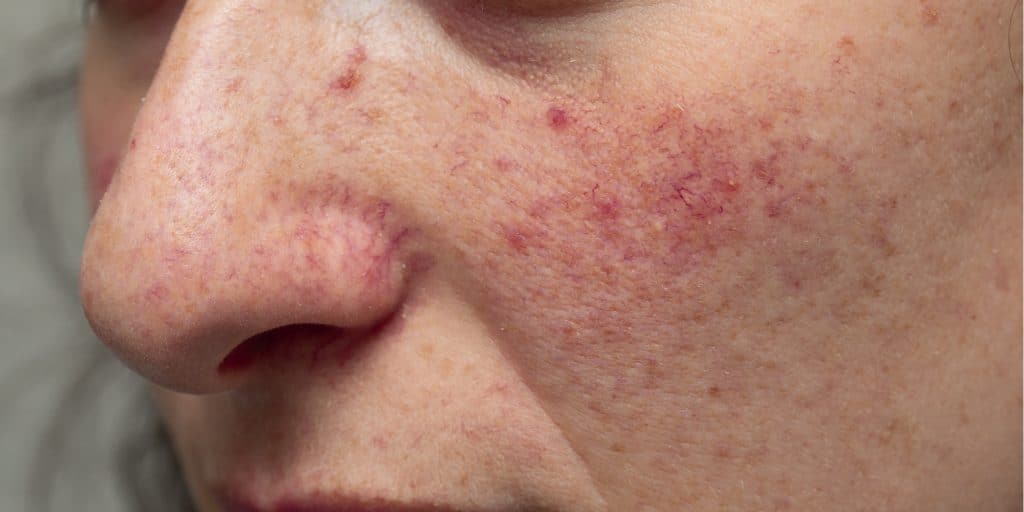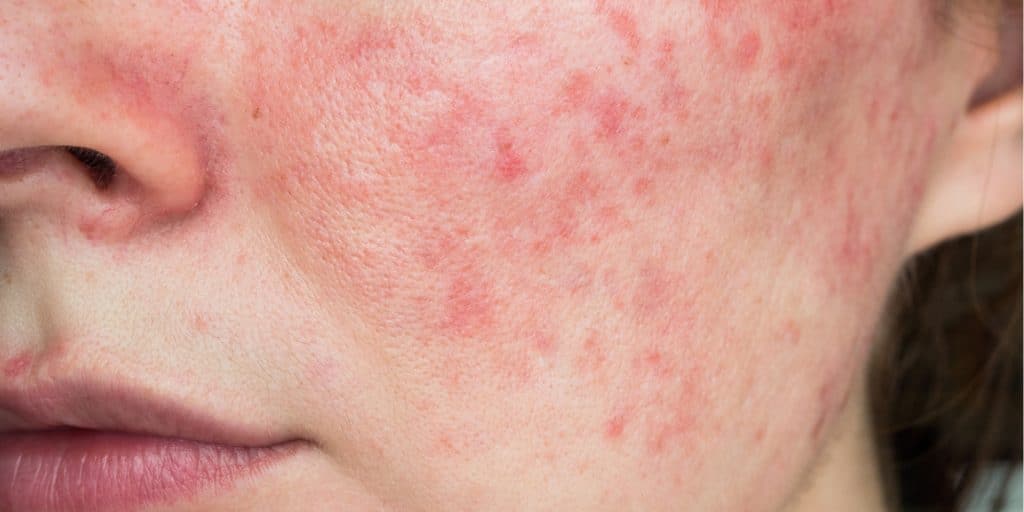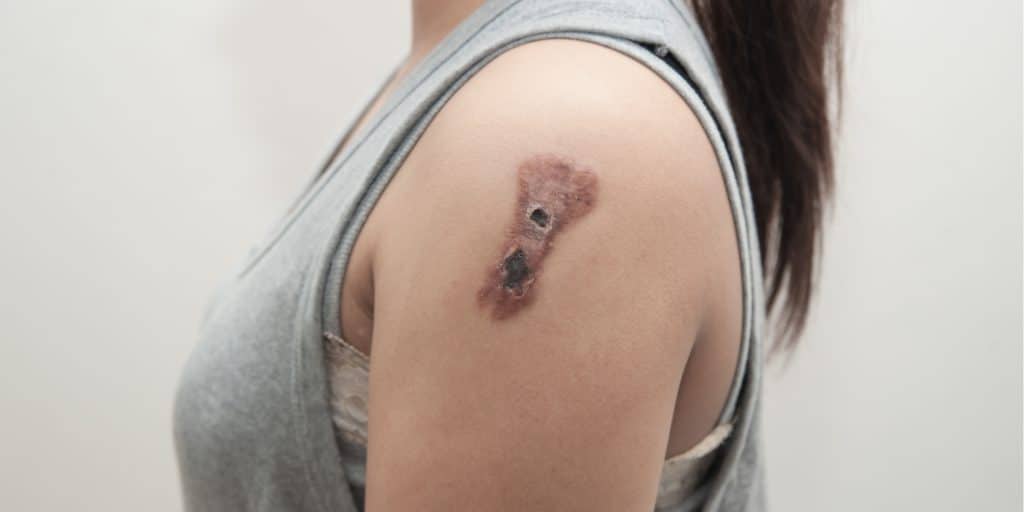
It’s not a secret that alcohol isn’t good for you. But did you know that there can be serious negative effects of alcohol on the skin? There are common perceptions of heavy drinkers as having flushed, ruddy cheeks, but that’s far from the full extent of alcoholic damage to skin.
That’s why we’re going to tell you all about the damaging effects of alcohol on the skin. Keep reading for vital information about alcohol skin rashes, facial signs of alcohol poisoning, and all the other effects of alcohol on the skin.
Different Types of Alcoholic Skin Damage

Alcohol affects individuals differently, and that reflects in the types of alcoholic skin damage that people experience. While there are too many adverse effects to name, we’re going to list the ten most common ways that alcohol can damage your skin.
1. Rosacea
If you’ve heard of rosacea, then you know that it’s a skin condition that causes patches of skin to look red and irritated. Most commonly, rosacea can appear on the cheeks, forehead, chin, or nose. But did you know that alcohol can cause rosacea?
For a long time, experts believed that alcohol could only cause rosacea flare-ups in those who already had the condition. But according to the American Academy of Dermatology, there is compelling evidence that alcohol may increase your risk of developing rosacea.
2. Acne
Drinking alcohol does not directly cause acne. However, drinking can disrupt your body’s natural hormones. And since these hormones play an important factor in skin health, including acne, any disruption in your hormones can lead to breakouts. If this becomes a consistent issue, one of the effects of alcohol on the skin may also be permanent acne scarring.
3. Cellulitis
When it comes to negative effects of alcohol on the skin, cellulitis is among the most dangerous. This bacterial infection in the legs causes red, swollen, painful skin that requires medical treatment to cure. And since alcohol weakens your body’s immune system, it can significantly increase your risk of developing cellulitis.
The good news is that cellulitis can be treated with antibiotics. But if you can’t afford to see a doctor, then alcohol-related cellulitis can be a much more serious issue.
4. Swollen Eyes
After a night of drinking, many people may feel swollen or bloated. This is because alcohol causes dehydration, which can lead to puffiness in sensitive areas, like the skin around the eyes. Staying hydrated while drinking alcohol can substantially lower your risk of dealing with puffy, irritated eyes the next morning.
5. Dark Circles
It’s not uncommon for people to use alcohol as a “nightcap.” But contrary to popular belief, alcohol does not make you sleep better. While it may make you drowsy and quicker to fall asleep, it can actually disrupt your body’s natural circadian rhythm. This means tossing and turning, waking up throughout the night, and other indicators of poor sleep. As a result, many people find themselves dealing with dark circles after a night of drinking, even if they spent eight hours in bed.
6. Psoriasis
Psoriasis is a common skin condition characterized by dry, itchy, flaky skin. And chronic heavy drinking can greatly increase your risk of developing it. This may be because the pleasure-reward chemicals that lead to alcohol addiction are also related to the body’s inflammation response, which is what causes psoriasis in the first place.
And if you already have psoriasis, drinking alcohol may interfere with your treatments. Alcohol doesn’t mix well with common psoriasis treatments, so drinking with psoriasis could make your flare-ups even worse and slower to treat.
7. Skin Cancer
The effects of alcohol on the skin are not just aesthetic—they can be life-threatening. The American Society of Clinical Oncology recognizes that alcohol is a modifiable factor in assessing your skin cancer risk. That means that long-term alcohol abuse can increase your risk of skin cancer, so it’s wise to consider your drinking habits, particularly if you engage in other high-risk activities like frequent tanning.
Effects of Alcohol Are More Than Skin Deep

While there are plenty of negative effects of alcohol on the skin, these are far from the only dangers of drinking. Alcohol has been linked to liver damage, weakened immune system function, and a host of other health problems. And if your alcohol use has started reflecting on your skin, then there’s a very real chance that there is internal damage as well.
Luckily, it is never too late to quit drinking. At the Veteran’s Journey Recovery Center in Las Vegas, Nevada, we are committed to helping individuals recover from alcohol addiction for good. And with a variety of evidence-based treatment options, we do everything in our power to make the process as easy as possible.
In our residential and inpatient alcohol rehabilitation programs, we provide reliable alcohol addiction treatment. Some of our most common programs and treatments include:
- Individual and group therapy
- Complementary therapies (i.e., yoga and recreational therapy)
- Cognitive behavioral therapy (CBT)
- Dialectical behavior therapy (DBT)
- Acceptance and commitment therapy (ACT)
- Motivational interviewing (MI)
- Mindfulness and meditation
- Trauma-informed care
- Clinical hypnotherapy
- 12-step recovery groups
If you’ve started seeing negative effects of alcohol on the skin, then there’s a real chance that you may need help. All you have to do is ask for it. You can call our friendly admissions team at 888-828-2623 or ask your questions online. The best time to ask for addiction help is yesterday, but the second best time is today.
The post 7 Effects of Alcohol on the Skin That You Didn’t Know appeared first on VJRC.
Source
Original Author: Veteran’s Journey Recovery Center

